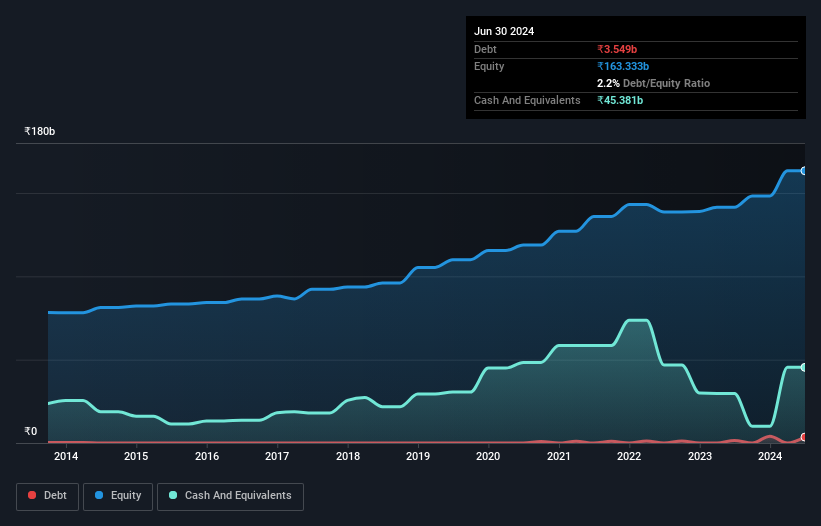Some say volatility, rather than debt, is the best way to think about risk as an investor, but Warren Buffett famously said that 'Volatility is far from synonymous with risk.' It's only natural to consider a company's balance sheet when you examine how risky it is, since debt is often involved when a business collapses. We note that ACC Limited (NSE:ACC) does have debt on its balance sheet. But should shareholders be worried about its use of debt?
When Is Debt Dangerous?
Debt is a tool to help businesses grow, but if a business is incapable of paying off its lenders, then it exists at their mercy. Ultimately, if the company can't fulfill its legal obligations to repay debt, shareholders could walk away with nothing. However, a more frequent (but still costly) occurrence is where a company must issue shares at bargain-basement prices, permanently diluting shareholders, just to shore up its balance sheet. Of course, debt can be an important tool in businesses, particularly capital heavy businesses. The first thing to do when considering how much debt a business uses is to look at its cash and debt together.
Check out our latest analysis for ACC
What Is ACC's Net Debt?
As you can see below, at the end of March 2024, ACC had ₹3.55b of debt, up from ₹1.53b a year ago. Click the image for more detail. However, it does have ₹45.4b in cash offsetting this, leading to net cash of ₹41.8b.

How Strong Is ACC's Balance Sheet?
Zooming in on the latest balance sheet data, we can see that ACC had liabilities of ₹61.0b due within 12 months and liabilities of ₹9.55b due beyond that. On the other hand, it had cash of ₹45.4b and ₹17.7b worth of receivables due within a year. So its liabilities outweigh the sum of its cash and (near-term) receivables by ₹7.45b.
Having regard to ACC's size, it seems that its liquid assets are well balanced with its total liabilities. So while it's hard to imagine that the ₹458.8b company is struggling for cash, we still think it's worth monitoring its balance sheet. Despite its noteworthy liabilities, ACC boasts net cash, so it's fair to say it does not have a heavy debt load!
Even more impressive was the fact that ACC grew its EBIT by 127% over twelve months. That boost will make it even easier to pay down debt going forward. When analysing debt levels, the balance sheet is the obvious place to start. But it is future earnings, more than anything, that will determine ACC's ability to maintain a healthy balance sheet going forward. So if you're focused on the future you can check out this free report showing analyst profit forecasts.
Finally, a business needs free cash flow to pay off debt; accounting profits just don't cut it. ACC may have net cash on the balance sheet, but it is still interesting to look at how well the business converts its earnings before interest and tax (EBIT) to free cash flow, because that will influence both its need for, and its capacity to manage debt. Over the last three years, ACC recorded negative free cash flow, in total. Debt is far more risky for companies with unreliable free cash flow, so shareholders should be hoping that the past expenditure will produce free cash flow in the future.
Summing Up
While it is always sensible to look at a company's total liabilities, it is very reassuring that ACC has ₹41.8b in net cash. And we liked the look of last year's 127% year-on-year EBIT growth. So we don't have any problem with ACC's use of debt. The balance sheet is clearly the area to focus on when you are analysing debt. However, not all investment risk resides within the balance sheet - far from it. Case in point: We've spotted 1 warning sign for ACC you should be aware of.
If, after all that, you're more interested in a fast growing company with a rock-solid balance sheet, then check out our list of net cash growth stocks without delay.
New: Manage All Your Stock Portfolios in One Place
We've created the ultimate portfolio companion for stock investors, and it's free.
• Connect an unlimited number of Portfolios and see your total in one currency
• Be alerted to new Warning Signs or Risks via email or mobile
• Track the Fair Value of your stocks
Have feedback on this article? Concerned about the content? Get in touch with us directly. Alternatively, email editorial-team (at) simplywallst.com.
This article by Simply Wall St is general in nature. We provide commentary based on historical data and analyst forecasts only using an unbiased methodology and our articles are not intended to be financial advice. It does not constitute a recommendation to buy or sell any stock, and does not take account of your objectives, or your financial situation. We aim to bring you long-term focused analysis driven by fundamental data. Note that our analysis may not factor in the latest price-sensitive company announcements or qualitative material. Simply Wall St has no position in any stocks mentioned.
About NSEI:ACC
ACC
Engages in the manufacture and sale of cement and ready-mix concrete in India.
Undervalued with excellent balance sheet.
Similar Companies
Market Insights
Community Narratives





